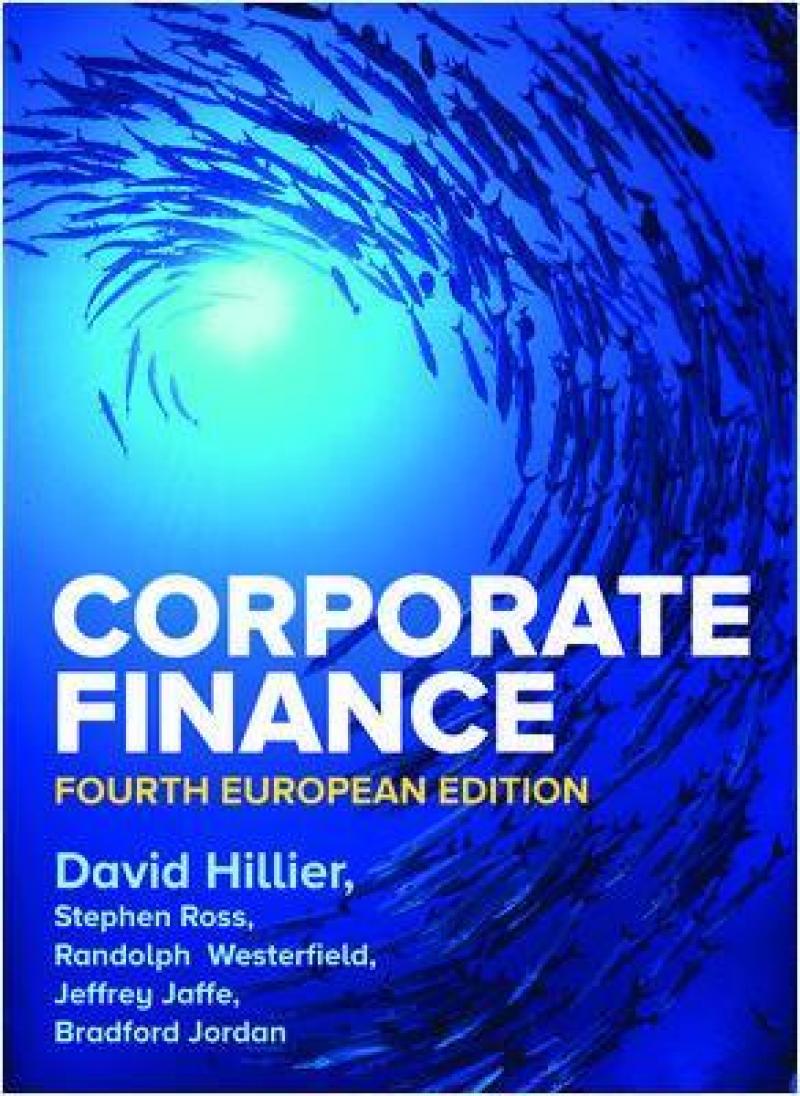The fourth edition of Corporate Finance takes an applied approach to cover all the latest research and topic areas important to students taking Finance courses. The new edition provides an international perspective on all areas of corporate finance and has been updated to include discussion on current trends such as the rise of populism and trade barriers on international finance, the advent of Financial Technology, and key regulatory changes impacting the sector. Understanding and Application•Clear, user-friendly style•Example boxes in every chapter provide hypothetical examples to illustrate theoretical concepts such as cash flow timing, dividend smoothing and differential growth.•Real World Insight boxes use real companies like Siemens, Avast and Adidas to show how they have applied corporate finance theories and concepts to their businesses and business decisions.•Chapter links in the margin provide quick cross-referencing to show students the connections between topics.Practice and Proficiency•Mini and Practical cases present scenarios and questions to practice applying what you have learnt. •Rigorous testing: between 30 and 40 Questions and Problems per chapter are categorised by topic and level of difficulty.•Numbered maths equations and key notation boxes listing the variables and acronyms that will be encountered in each chapter, designed to encourage mastery of Maths.•Exam Questions designed to take 45 minutes and test you on material learned in a more formal exam style.•Connect® resources include algorithmic questions designed to ensure equations and calculations are not learned by rote but by thorough understanding and practice New to This Edition•Updated discussions on peer-to-peer trading, cash flow forecasting methods, import/export partners and additional investment appraisal methods•Updated chapters on corporate governance to reflect global changes, efficient markets and mergers and acquisition to reflect new research, financial distress to reflect new data with discussion on trends and insolvencies and fully updated chapter on Leasing to reflect new IFRS standards•New section on Modified Internal Rate of Return and Margin of Safety in Investment Appraisal, Net Asset Value, Islamic Financing, and alternatives to CAPM to reflect research developments• NEW: This edition has now been updated with 8 new videos that covers a worked example from the text and each video has associated concept check questions. The videos are now available on Connect® and cover:• Chapter 1 & 2: Introduction to Finance and Corporate Governance • Chapter 5: Long-Term Financing• Chapter 6: Investment Appraisal• Chapter 9 & 10: Risk and Return• Chapter 15 and 16: Equity and Debt Valuation • Chapter 20: Advanced Capital Budgeting• Chapter 21: Dividends• Chapter 22: OptionsDavid Hillier is Associate Principal and Executive Dean of the University of Strathclyde Business School. A Professor of Finance, David was recognized as being in the top 3 per cent of the most prolific finance researchers in the world over the past 50 years (Heck and Cooley, 2009) and appears regularly in the media as a business commentator.
Les mer
Part I: Overview1 Introduction to Corporate Finance2 Corporate GovernancePart II: Value and Capital Budgeting3 Financial Statement Analysis 4 Discounted Cash Flow Valuation5. How to Value Bonds and StocksAppendices Online6 Net Present Value and Other Investment Rules7 Making Capital Investment Decisions8 Risk Analysis, Real Options, and Capital BudgetingPart III: Risk9 Risk and Return: Lessons from Market History10 Risk and Return: The Capital Asset-Pricing Model11 Factor Models and the Arbitrage Pricing Theory12 Risk, Cost of Capital, and Capital Budgeting13 Efficient Capital Markets and Behavioural FinancePart IV: Long-Term Financing14 Long Term Financing: An Introduction15 Equity Financing16 Debt Financing17 LeasingPart V: Capital Structure and Dividend Policy18 Capital Structure: Basic Concepts19: Capital Structure: limits to the use of debt20: Valuation and Capital Budgeting for the Levered Firm21: Dividends and Other PayoutsPart VI: Options, Futures, and Corporate Finance22 Options and Corporate Finance23 Options and Corporate Finance: Extensions and Applications24 Warrants and Convertibles25 Financial Risk Management with DerivativesPart VII: Financial Planning and Short Term Finance26 Short Term Finance and Planning27 Short Term Capital ManagementPart VIII: Special Topics28 Mergers and Acquisitions29 Financial Distress30 International Corporate Finance
Les mer
Produktdetaljer
ISBN
9781526848086
Publisert
2020-01-29
Utgave
4. utgave
Utgiver
Vendor
McGraw-Hill Education (UK) Ltd
Vekt
1494 gr
Høyde
260 mm
Bredde
192 mm
Dybde
33 mm
Aldersnivå
UU, 05
Språk
Product language
Engelsk
Format
Product format
Heftet
